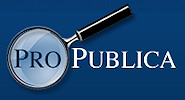Part of a series on databases to help in daily reporting.
One important journalistic principle is avoiding conflicts of interest. We usually think about that for journalist avoiding ties that might taint their work. But I think it applies to sources as well –making sure we use independent sources or know their connections to any companies about which they speak. Thus it might be helpful for you to know if any of the doctors you have used , or might use in a story about prescription drugs have been paid by drug companies.
The expenses may be legitimate. Many would argue that doctors have a right to be reimbursed if they lead a seminar, for example, at an event funded by a pharmaceutial company. And such payments don’t mean their interview with you is necessarily tainted. But you’d probably rather know that have a reader, viewer, or listener point it out. 
Pro Publica took all the information it could find from drug companies about their payments to doctors, cleaned and standardized the data and published it as a searchable database, Dollars for Docs. It was not an easy task. But its database is easy to use.
Be sure to read the “about the data” section on the ProPublica site so you understand that database’s sources, coverage and classification system.
Some of the drug companies provided the information as the result of legal settlements with the feds. Pro Publica reports that the federal government will require all drug companies to do so beginning next year, and will put the information on a searchable databases for consumers. Until then, check out the Dollars for Docs.